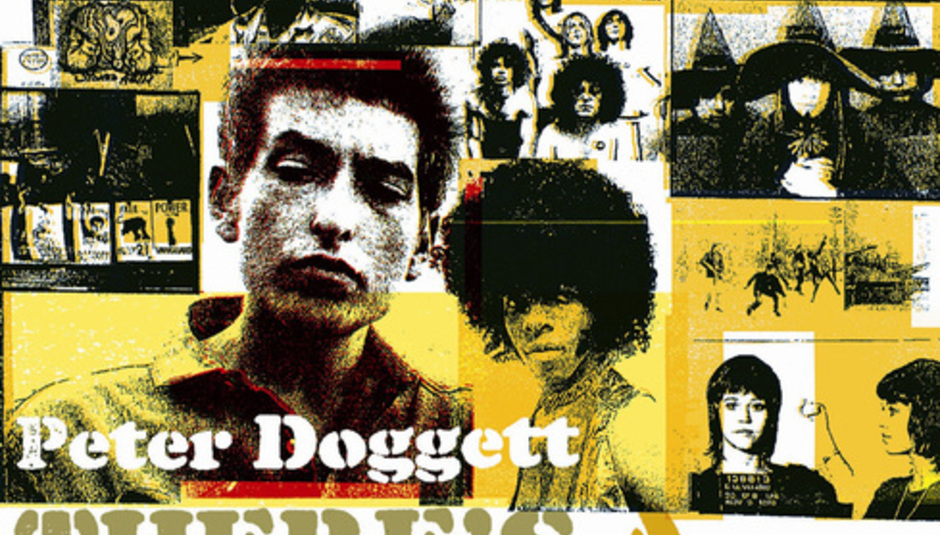On a day when many of us take to the streets of London to demonstrate ahead of tomorrow's G20 summit - and various publications dust off old arguments bemoaning the lack of protest in modern music - Alexander Tudor considers Peter Doggett's excellent, unromanticised account of the Sixties counter culture.
The hefty title and actual physical heft of the book itself tells you plenty – this is going to be a scholarly account of the equivalent of our own last days of Rome (~ 1966 – 1972). Still, the quote on the cover is particularly revealing:
‘Grab a copy By Any Means Necessary – 5 Stars, MOJO’
Peter Doggett is a Mojo writer himself, and recipient of their award for Best Book 2008, but this isn’t a point about nepotism – they’re right, you DO need this. The point is that they didn’t say 'Steal This Book' – and they couldn’t. That phrase has been as debased as any other slogan and image of the era (you thought The Pope Smokes Dope was a T-shirt from Camden Market?). In a sense, that’s the depressing message you might glean from it all – everything gets commodified in the end, especially dissent, which is why (heavens no!) we couldn’t possibly ask anyone to steal this book; he needs the money...
Let’s not get ahead of ourselves, though. What Doggett has produced is an intelligible, enjoyable, thorough – perhaps even 'definitive' – account of the pivotal moment when it was possible to believe that music, art, poetry, street theatre, and sloganeering could change the world. From the start, all those epochal developments – the Civil Rights movement, Vietnam, the Nixon administration, Communist expansion in Indochina, the rise of the Nation of Islam and the Black Panthers – aren’t just in the background: they are the story. You’ve probably read a hundred features about rock’n’roll bands in which you get a potted history of the Sixties or Seventies in the first paragraph. Thing is, the CIA really did consider these people a threat, there were running battles in the streets, and Huey Newton really did treat Highway 61 Revisited as a prophetic text about the oppression of the American negro (Maggie’s Farm = capitalism, etc). Revolutionaries didn’t merely flirt with rock stars to raise funds and awareness – they each thought they were the other, and were ultimately destroyed by the same temptations (drugs, groupies, wanton egotism).
Doggett separates the strands elegantly, and effectively: 1) Folk and Rock Stars involved in the Civil Rights and Protest Movements; 2) Radical Black Movements, Christian and Non-Christian; 3) Black Musicians and Poets involved with these Movements; 4) Poets, Artists, and other Agitators connecting the Movements. Having done so, it’s easy to see whose methods were going to be more or less problematic; why the most significant (or positive) development arising from all this was that black record labels and radio-stations were the major inroads for black-owned business; how all four camps treated their 'sisters' just as shoddily, and might as well have never heard of feminism.
It’s hard to think of any account of the counter-culture that gives equal weight to these strands, or shows the necessity of considering them together – you’d have to look to Marxist analyses like Dell Hymes’ essay Reinventing Anthropology (1972), or Greil Marcus's Lipstick Traces (1989), which attempts to link up manifestations of Communalism from the Middle Ages to the Sixties and then punk, but ultimately comes across almost as loopy as the people it describes.
Doggett, on the other hand, shows the lives of the main players intersecting with global politics, and effortlessly moves between the personal and geopolitical, with a deftness (and profundity) that recalls The Shock Doctrine (2007) by Naomi Klein. This isn’t easy to do – John Gray’s Black Mass (also 2007) told a similar story, to considerable acclaim, but failed to show the human impact, and mistook the political writing of an age for its actual character. When Doggett discusses an artifact like Lennon & Ono’s Some Time in New York City, say, he digs up reviews proclaiming it the most important protest album ever made, juxtaposes them with more critical ones; tells us about the figures celebrated in song who had all been released from prison by the time it came out; shows that Lennon had some success funding violent direct action groups whilst fighting his battle with US immigration; ends the book with Lennon, Ginsberg, and others watching Nixon’s re-election, during which Lennon denounced them all, shagged Abbie Hoffmann’s lover, and then went home with Yoko, who he’d just blamed for drying up his creativity with her own projects about women’s rights.
In other words, this is a magnificent account of a period whose repercussions are felt today: in a sense, reality was being adjusted circa1966, but we’ve never really lost the sense that you can change the world by watching TV, listening to angry music, or complaining. There was a time when people sincerely asked, often in song: could you wish the bombs away? Could you put flowers in the barrels of guns? Was the problem that no-one thought to give peace a chance? The Shock Doctrine presents a powerful theory explaining the state of contemporary society, but this book goes a long way to explaining the origins of the Apathy Doctrine, or the Cynicism Doctrine that pervades contemporary culture, keeping young voters from caring, and allowing older voters to smugly tell themselves 'at least we tried'. By the end, Bob Dylan only seems ahead of his time because he became cynical a decade before everyone else; Joan Baez comes across as the bravest of the lot (travelling to North Vietnam to deliver letters to POWs, shortly before the peace agreement), but also futile, because black groups didn’t like her, and white men neglected her. John Lennon comes across as even more of a monstrous prick than you ever thought possible, making Richard Nixon look almost sympathetic.
Doggett doesn’t say much, himself, about the after-effects – his epilogue suggests that the perceived failure of the counter culture by 1972 prevented anyone protesting about the subsequent CIA-sponsored coup in Chile, which signalled the US had learned nothing about the perils of intervention – nonetheless, the implications are evident and endless. It’s daring to write a book so bleak and so damning but it’s no less vital for it.






















